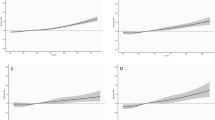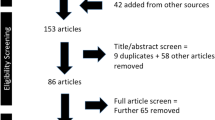Abstract
Purpose
The association between caffeine intake and the risk of recurrent kidney stones is unknown. We examined the association between caffeine intake and the risk of recurrent kidney stones in adults.
Methods
Individuals with history of passing at least one kidney stone were included from 2007 to 2014 National Health and Nutrition Examination Survey. Recurrent kidney stones were defined using a standard questionnaire and structured dietary recalls were used to determine caffeine intake. The weighted logistic regression was used to assess the association between caffeine intake and the risk of recurrent kidney stones, and the non-linear relationship was explored with restricted cubic splines. Caffeine and dietary confounders (minerals and vitamins) were adjusted for total energy intake with residual model.
Results
The multivariate-adjusted odds ratios (95% confidence intervals) of recurrent kidney stones for per-quartile increment in caffeine intake were 1.15 (1.01–1.31) overall, 1.11 (0.96–1.29) for white race individuals, 1.33 (1.09–1.63) for non-white race individuals, 1.15 (0.97–1.36) for men, 1.24 (1.01–1.53) for women, 1.54 (1.08–2.19) for non-overweight individuals, 1.11 (0.97–1.28) for overweight/obese individuals, 1.13 (0.99–1.29) for caffeine from coffee, and 0.90 (0.79–1.03) for caffeine from non-coffee sources. A linear relationship was found between caffeine intake and the risk of recurrent kidney stones overall and in subgroup analyses.
Conclusion
Compared with those who reported passing only one kidney stone, caffeine intake was independently and linearly associated with a higher risk of recurrent kidney stones in adults, especially for women, individuals of non-white race and non-overweight subjects. The increased risk may arise from caffeine from coffee.

Similar content being viewed by others
References
Khan SR, Pearle MS, Robertson WG et al (2016) Kidney stones. Nat Rev Dis Primers 2:16008
Tundo G, Khaleel S, Pais VM Jr (2018) Gender equivalence in the prevalence of nephrolithiasis among adults younger than 50 years in the United States. J Urol 200:1273–1277
Scales CD Jr, Smith AC, Hanley JM, Saigal CS (2012) Prevalence of kidney stones in the United States. Eur Urol 62:160–165
Jung H, Andonian S, Assimos D et al (2017) Urolithiasis: evaluation, dietary factors, and medical management: an update of the 2014 SIU-ICUD international consultation on stone disease. World J Urol 35:1331–1340
Ferraro PM, Taylor EN, Gambaro G, Curhan GC (2017) Dietary and lifestyle risk factors associated with incident kidney stones in men and women. J Urol 198:858–863
Zhang Y, Coca A, Casa DJ, Antonio J, Green JM, Bishop PA (2015) Caffeine and diuresis during rest and exercise: a meta-analysis. J Sci Med Sport 18:569–574
Massey LK, Sutton RA (2004) Acute caffeine effects on urine composition and calcium kidney stone risk in calcium stone formers. J Urol 172:555–558
Gambaro G, Croppi E, Bushinsky D et al (2017) The risk of chronic kidney disease associated with urolithiasis and its urological treatments: a review. J Urol 198:268–273
Peerapen P, Thongboonkerd V (2018) Caffeine in kidney stone disease: risk or benefit? Adv Nutr 9:419–424
Ferraro PM, Taylor EN, Gambaro G, Curhan GC (2013) Soda and other beverages and the risk of kidney stones. Clin J Am Soc Nephrol 8:1389–1395
Chen HY, Wu JS, Chang YF et al (2018) Increased amount and duration of tea consumption may be associated with decreased risk of renal stone disease. World J Urol 37:379–384
Shu X, Cai H, Xiang YB et al (2018) Green tea intake and risk of incident kidney stones: Prospective cohort studies in middle-aged and elderly Chinese individuals. Int J Urol 26:241–246
Ferraro PM, Taylor EN, Gambaro G, Curhan GC (2014) Caffeine intake and the risk of kidney stones. Am J Clin Nutr 100:1596–1603
Bigotte Vieira M, Magrico R, Viegas Dias C, Leitao L, Neves JS (2019) Caffeine consumption and mortality in chronic kidney disease: a nationally representative analysis. Nephrol Dial Transpl 34:974–980
Neves JS, Leitao L, Magrico R et al (2018) Caffeine consumption and mortality in diabetes: an analysis of NHANES 1999–2010. Front Endocrinol 9:547
Fulgoni VL 3rd, Keast DR, Lieberman HR (2015) Trends in intake and sources of caffeine in the diets of US adults: 2001–2010. Am J Clin Nutr 101:1081–1087
Takayama M, Wetmore CM, Mokdad AH (2012) Characteristics associated with the uptake of influenza vaccination among adults in the United States. Prev Med 54:358–362
Willett WC, Howe GR, Kushi LH (1997) Adjustment for total energy intake in epidemiologic studies. Am J Clin Nutr 65:1220S-8S (discussion 9S-31S)
Wu ZB, Jiang T, Lin GB et al (2017) Tea consumption is associated with increased risk of kidney stones in Northern Chinese: a cross-sectional Study. Biomed Environ Sci 30:922–926
Peerapen P, Thongboonkerd V (2016) Caffeine prevents kidney stone formation by translocation of apical surface annexin A1 crystal-binding protein into cytoplasm: in vitro evidence. Sci Rep 6:38536
Tiselius HG, Larsson L (1981) Biochemical evaluation of patients with urolithiasis. Eur Urol 7:31–34
van Dam RM, Feskens EJ (2002) Coffee consumption and risk of type 2 diabetes mellitus. Lancet 360:1477–1478
van Dam RM, Dekker JM, Nijpels G, Stehouwer CD, Bouter LM, Heine RJ (2004) Coffee consumption and incidence of impaired fasting glucose, impaired glucose tolerance, and type 2 diabetes: the Hoorn Study. Diabetologia 47:2152–2159
Feskanich D, Rimm EB, Giovannucci EL et al (1993) Reproducibility and validity of food intake measurements from a semiquantitative food frequency questionnaire. J Am Diet Assoc 93:790–796
Ahluwalia N, Herrick K, Moshfegh A, Rybak M (2014) Caffeine intake in children in the United States and 10-y trends: 2001–2010. Am J Clin Nutr 100:1124–1132
Author information
Authors and Affiliations
Corresponding author
Ethics declarations
Conflict of interest
The authors declare that they have no conflict of interest.
Electronic supplementary material
Below is the link to the electronic supplementary material.
Rights and permissions
About this article
Cite this article
Sun, Y., Wang, D. & Zhou, Q. Caffeine intake and the risk of recurrent kidney stones in adults, an analysis of 2007–2014 National Health and Nutrition Examination Surveys. Eur J Nutr 59, 2683–2692 (2020). https://doi.org/10.1007/s00394-019-02115-0
Received:
Accepted:
Published:
Issue Date:
DOI: https://doi.org/10.1007/s00394-019-02115-0




